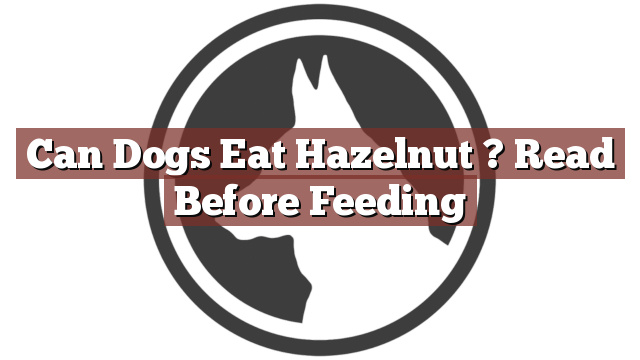Understanding Your Dog’s Dietary Needs
As a responsible pet owner, it is crucial to understand your dog’s dietary needs to ensure their health and well-being. Dogs require a balanced diet that consists of proteins, fats, carbohydrates, vitamins, and minerals. While it is natural to want to share your favorite foods with your furry friend, not all human foods are safe for dogs. Some can even be toxic and lead to serious health issues. Consequently, it is essential to research and consult with a veterinarian before introducing any new food into your dog’s diet.
Can Dogs Eat Hazelnut? Read Before Feeding
Can dogs eat hazelnuts? The answer is yes, but with caution. Hazelnuts are not toxic to dogs, and in small quantities, they are generally safe to consume. However, it is important to note that hazelnuts should never be a regular part of your dog’s diet. These nuts are high in fat, which can lead to weight gain, pancreatitis, and digestive issues in dogs. Additionally, some dogs may be allergic to hazelnuts, causing gastrointestinal upset, itching, or even more severe allergic reactions.
Pros and Cons of Feeding Hazelnuts to Dogs
While hazelnuts can be given to dogs in moderation, it is important to weigh the pros and cons before doing so. Hazelnuts are a good source of vitamin E, healthy fats, and antioxidants. These nutrients can contribute to your dog’s overall health and promote a shiny coat. However, the high-fat content in hazelnuts can pose a risk, particularly for dogs prone to obesity or with underlying health conditions. Feeding your dog too many hazelnuts can lead to weight gain, which can strain their joints and increase the risk of developing diseases such as diabetes or heart problems. Moreover, the hard shell of the hazelnut can be a choking hazard or cause intestinal blockage if not properly chewed.
In Conclusion: Hazelnuts and Your Dog’s Health
Can a dog eat hazelnuts? The answer is yes, but it is important to exercise caution and moderation. While hazelnuts are not toxic to dogs, the high-fat content and potential for allergies or gastrointestinal issues make them an occasional treat rather than a regular part of their diet. If you decide to feed your dog hazelnuts, make sure they are unsalted and free from any flavorings or additives. Always introduce new foods gradually and monitor your dog for any adverse reactions. It is best to consult with your veterinarian to determine the suitability of hazelnuts for your individual dog’s dietary needs. Remember, your dog’s health is always the top priority, so be mindful of their well-being when considering adding hazelnuts or any other human food to their diet.
Thank you for taking the time to read through our exploration of [page_title]. As every dog lover knows, our furry friends have unique dietary needs and responses, often varying from one canine to another. This is why it's paramount to approach any changes in their diet with caution and knowledge.
Before introducing any new treats or making alterations to your dog's diet based on our insights, it's crucial to consult with a veterinarian about [page_title]. Their expertise ensures that the choices you make are well-suited to your particular pet's health and well-being.
Even seemingly harmless foods can sometimes lead to allergic reactions or digestive issues, which is why monitoring your dog after introducing any new food item is essential.
The content provided here on [page_title] is crafted with care, thorough research, and a genuine love for dogs. Nevertheless, it serves as a general guideline and should not be considered a substitute for professional veterinary advice.
Always prioritize the expert insights of your veterinarian, and remember that the health and happiness of your furry companion come first.
May your journey with your pet continue to be filled with joy, love, and safe culinary adventures. Happy reading, and even happier snacking for your canine friend!

